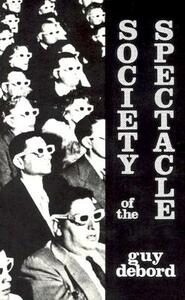Take a photo of a barcode or cover
Spectacles are haunting and taunting modernity, the spectacles that are part and parcel of representing what it means to be human in the contemporary world. Written during the late 60s in France during the inclement political climate like new left movements, conflicts on the ideologies of existentialism, structuralism, this collection of thesis mainly takes the argument on critiquing then image-obsessed consumer culture through the ways of effective consumer, marketer and remain alienated all at the same time (most of which are more relevant now with our social media stricken lives lately).
The writing of Guy Debord here remains inclusive of giving criticism on the understanding and undermining of the institutions of public and personal consumption, on the historical materialism, on the malnourishment of certain ways of historiography visiting from works of Hegel and Marx especially. Writing content is abstract to some extent nevertheless it could be deeply disturbing otherwise. Imagine a world where even to feel connected requires centralized networks with myriads of political coercion to sell ourselves out and make performative rituals and call it whatever the people want to call it. Of course, generalization wouldn't work when there are peoples doing the same oblivious or remain apolitical about the layers of environment we have been living in.
As much as there are efforts to criticize the existing structures as well as the efforts to capture/dismantle them, the work is heavily inspired by Marxist tradition. I think its duly necessary for any sympathiser of left politics to read works like these unless they're okay with being a part of some performative stunts.
The writing of Guy Debord here remains inclusive of giving criticism on the understanding and undermining of the institutions of public and personal consumption, on the historical materialism, on the malnourishment of certain ways of historiography visiting from works of Hegel and Marx especially. Writing content is abstract to some extent nevertheless it could be deeply disturbing otherwise. Imagine a world where even to feel connected requires centralized networks with myriads of political coercion to sell ourselves out and make performative rituals and call it whatever the people want to call it. Of course, generalization wouldn't work when there are peoples doing the same oblivious or remain apolitical about the layers of environment we have been living in.
As much as there are efforts to criticize the existing structures as well as the efforts to capture/dismantle them, the work is heavily inspired by Marxist tradition. I think its duly necessary for any sympathiser of left politics to read works like these unless they're okay with being a part of some performative stunts.
Once the predecessor to The Situationists International, the Lettrists, disrupted a Chaplin press conference to assert the belief "that the most urgent expression of freedom is the destruction of idols, especially when they claim to represent freedom."
Society of the Spectacle certainly holds up as difficult to tackle, my copy is blackened with margin notes.
An expansion on marxist ideas of alienation, commodity fetishization, and ideology. Focused on the illusions of grandeur and the snuffing of innate human inclination to create things and create ourselves.
I don't know if it's a testament to the text or just simply depressing how spectacle holds up as a critic of social media in terms of late-capitalism. The 'Lonely Crowd' mirroring Zizek ideas of a cyberspace monadology.
WE DEMAND GAMES WITH GREAT SERIOUSNESS.
WORK IS THE BLACKMAIL OF SURVIVAL.
Society of the Spectacle certainly holds up as difficult to tackle, my copy is blackened with margin notes.
An expansion on marxist ideas of alienation, commodity fetishization, and ideology. Focused on the illusions of grandeur and the snuffing of innate human inclination to create things and create ourselves.
I don't know if it's a testament to the text or just simply depressing how spectacle holds up as a critic of social media in terms of late-capitalism. The 'Lonely Crowd' mirroring Zizek ideas of a cyberspace monadology.
WE DEMAND GAMES WITH GREAT SERIOUSNESS.
WORK IS THE BLACKMAIL OF SURVIVAL.
challenging
informative
slow-paced
challenging
informative
fast-paced
Excellent read! A critique on human society that explains how we lose ourselves to “progress”. Debored explains how everything from art, travel, social interaction, writing, etc all become controlled by the needs of the elite. Eventually it becomes impossible to engage in any activity that doesn’t somehow help the elite and their personal interests. This creates an emptiness impossible to fill which then makes consumption a necessary distraction from the nonstop productivity of life. Eventually consumption and production become the only thing people live for with no way out. The intellectual class, media, and even educators become such a part of this system that they to help it grow and become one of its strongest elements. Eventually they become incapable of any thought that doesn’t help this process grow and continue. As a result of everyone becoming a consumer, producer, or propagandist all social life is degraded into something empty.
It was dense, but very insightful. I think that Debord oversimplifies some things about popular culture, but at the same time, part of me thinks that we need to look at things this way. I feel like i've been in denial my whole life about corporate America! The media is so intricate and I like the perspective given in this book. I'm not into conspiracy theories, but if I were, this would be one I would look into haha.
All seems VERY interesting and insightful, I underlined SO many sentences, but… in the end I think I only grasped 10% of it. Will have to reread later and perhaps read some thoughts of others about this work.
challenging
informative
reflective
medium-paced
informative
inspiring
reflective
slow-paced





